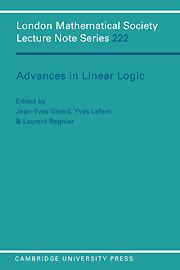Book contents
- Frontmatter
- Contents
- Preface
- Linear Logic: its syntax and semantics
- Part I Categories and semantics
- Part II Complexity and expressivity
- Deciding provability of linear logic formulas
- The direct simulation of Minsky machines in linear logic
- Stochastic interaction and linear logic
- Inheritance with exceptions
- Part III Proof theory
- Part IV Proof nets
- Part V Geometry of interaction
Stochastic interaction and linear logic
Published online by Cambridge University Press: 17 February 2010
- Frontmatter
- Contents
- Preface
- Linear Logic: its syntax and semantics
- Part I Categories and semantics
- Part II Complexity and expressivity
- Deciding provability of linear logic formulas
- The direct simulation of Minsky machines in linear logic
- Stochastic interaction and linear logic
- Inheritance with exceptions
- Part III Proof theory
- Part IV Proof nets
- Part V Geometry of interaction
Summary
Abstract
We present stochastic interactive semantics for propositional linear logic without modalities. The framework is based on interactive protocols considered in computational complexity theory, in which a prover with unlimited power interacts with a verifier that can only toss fair coins or perform simple tasks when presented with the given formula or with subsequent messages from the prover. The additive conjunction &, is described as random choice, which reflects the intuitive idea that the verifier can perform only “random spot checks”. This stochastic interactive semantic framework is shown to be sound and complete. Furthermore, the prover's winning strategies are basically proofs of the given formula. In this framework the multiplicative and additive connectives of linear logic are described by means of probabilistic operators, giving a new basis for intuitive reasoning about linear logic and a potential new tool in automated deduction.
Introduction
Linear logic arose from the semantic study of the structure of proofs in intuitionistic logic. Girard presented the coherence space and phase space semantics of linear logic in his original work on linear logic [Gir87]. While these models provide mathematical tools for the study of several aspects of linear logic, they do not oifer a simple intuitive way of reasoning about linear logic. More recently, Blass [Bla92], Abramsky and Jagadeesan [AJ94], Lamarche, and Hyland and Ong have developed semantics of linear logic by means of games and interaction. These new approaches have already proven fruitful in providing an evocative semantic paradigm for linear logic and have found a striking application to programming language theory in the work of Abramsky, Jagadeesan, and Malacaria [AJM93] and in the work of Hyland and Ong [HO93].
- Type
- Chapter
- Information
- Advances in Linear Logic , pp. 147 - 166Publisher: Cambridge University PressPrint publication year: 1995
- 4
- Cited by



